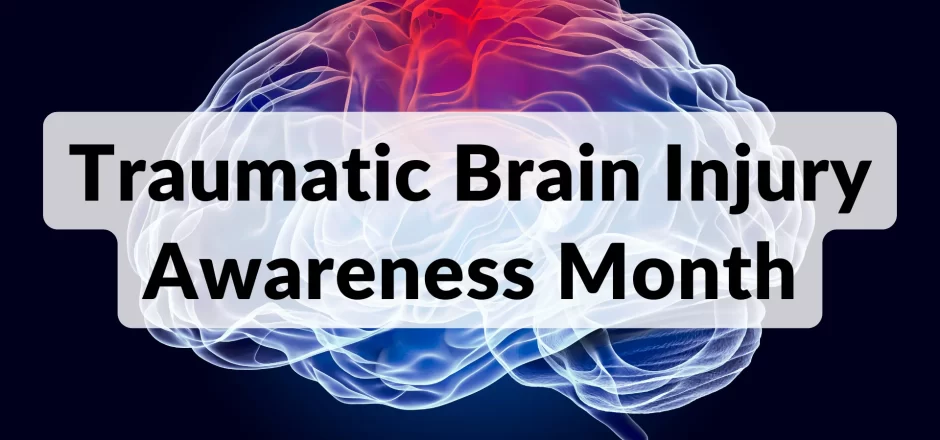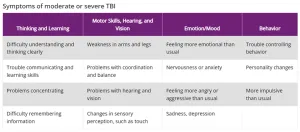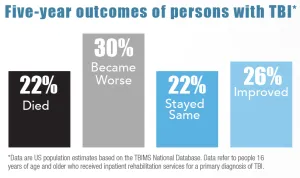Traumatic Brain Injury (TBI) Awareness & Prevention

We’ve all experienced a few bumps and bruises in our time, many short-lived without a lasting effect on our comfort or health. Suffering bumps and bruises to the head, however, can have a damaging and long-lasting impact on our quality of life if they result in a traumatic brain injury (TBI).
What is a Traumatic Brain Injury?
A traumatic brain injury, or TBI for short, is defined by the Mayo Clinicas a brain injury that “results from a violent blow or jolt to the head or body.” In addition, an object that penetrates and damages brain tissue, such as a bullet, can cause a TBI (Source).
Some leading causes of TBIs include:
- Falls: Falls are the leading cause of TBIs, particularly in children and older adults. Falls can occur from a height, such as a ladder or stairs, or from slipping and falling on a level surface.
- Motor vehicle accidents: Motor vehicle accidents, including car, motorcycle, and pedestrian accidents, are a common cause of TBIs. Even minor accidents can result in head injuries.
- Workplace accidents: Workplace accidents, particularly in industries such as construction, mining, and manufacturing, can result in TBIs.
- Sports injuries:Contact sports such as football, soccer, and hockey can increase the risk of TBIs. Non-contact sports such as skateboarding and skiing can also result in head injuries.
- Medical conditions: Medical conditions such as strokes, tumors, and infections can cause brain lesions, a type of TBI.
- Assaults: Physical assaults and assaults with weapons can cause TBIs in victims.
- Explosive blasts and combat injuries: Explosive blasts and other combat injuries commonly cause TBIs among military personnel.
Depending on the severity of the injury, TBIs can be life-changing and significantly affect an individual’s physical, cognitive, and emotional functioning. This range of symptoms can vary widely and is often determined by the extent and location of the impact.
Types of TBIs & Their Symptoms
According to the University of Missouri’s Brain Injury Guide, doctors will grade a TBI as mild, moderate, or severe.
Mild TBIs
Mild TBIs — also known as concussions — “generally do not show lesions on MRI or CT scans” (Source). This type of TBI is categorized as the least severe and may result in temporary symptoms such as headache, confusion, dizziness, and memory problems. These symptomstypically resolve within a few weeks to a few months with appropriate rest and treatment.
(Note:Though TBIs are commonly called “concussions” by the general public, not all are classified as concussions.)

However, up to 30% of post-concussion patients may experience “lingering symptoms that don’t go away with time and rest” (Source). In addition, even with few to no lingering symptoms, post-concussion patients “will always be more susceptible to another concussionthan someone who hasn’t had one” (Source).
Patients who have experienced multiple or repeat concussions are also at risk of developing long-term and potentially permanent symptoms.
Moderate to Severe TBIs
Compared to concussions, moderate and severe TBIs may result in a much longer recovery and permanent, life-altering symptoms or disabilities that resemble a chronic illness. The risk of death is also much higher. According to the CDC, “severe TBIs are linked to thousands of deaths each year” in the United States.

An indicator of moderate and severe TBIs is evidence of brain lesionson MRI or CT scans, which suggest that the brain tissue has suffered substantial, likely irreversible, damage.
Regarding symptoms, these TBIs can cause significant physical impairments in patients such as paralysis, loss of coordination, seizures, and difficulty speaking or swallowing. Cognitive impairments such as memory loss, difficulty with attention, and language problems can also occur, as well as emotional and behavioral changes like depression, anxiety, irritability, and impulsivity.
![]()
Depending on the severity, post-TBI patients may require ongoing medical care, rehabilitation, and support from family, friends, and healthcare professionals to help manage their symptoms and improve their quality of life.
Click here to learn more about how doctors classify TBI severity.
TBI Prevention & Risk Mitigation
There are several ways to reduce the risk of TBIs:
- Wear protective gear: When participating in sports or recreational activities such as biking, skateboarding, or skiing, wearing helmets, and other protective gear can help prevent head injuries.
- Use seat belts and child car seats:Properly using seat belts and child car seats can help prevent head injuries in a car accident.
- Prevent falls:Falls are a common cause of TBIs, particularly in children and older adults. Taking precautions such as installing handrails and non-slip mats in bathrooms, using step stools with handrails, and keeping walkways free of clutter can help prevent falls.
- Avoid risky behaviors:Engaging in risky behaviors such as driving under the influence of drugs or alcohol, not wearing seat belts while driving, and participating in contact sports without appropriate protective gear can increase the risk of TBIs.
- Practice workplace safety:Individuals who work in industries such as construction, mining, and manufacturing should follow appropriate safety protocols and wear appropriate protective gear to prevent head injuries.
It is important to note that not all TBIs can be prevented. However, taking these steps can help reduce the risk of traumatic brain injuries and increase the chances of a full recovery in the event of a head injury.
Injured on the job site in Missouri? Our legal team at Northland Injury Law is here to help! Text “HURT” to 22222 or call 816-327-7627 today for a FREE personal injury consultation with our top-rated, highly experienced attorneys.
Follow Uson Facebook, Instagram, and TikTok for more personal injury law content!






